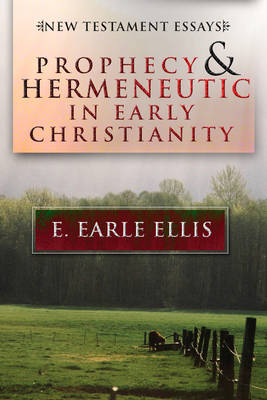
Bedankt voor het vertrouwen het afgelopen jaar! Om jou te bedanken bieden we GRATIS verzending (in België) aan op alles gedurende de hele maand januari.
- Afhalen na 1 uur in een winkel met voorraad
- In januari gratis thuislevering in België
- Ruim aanbod met 7 miljoen producten
Bedankt voor het vertrouwen het afgelopen jaar! Om jou te bedanken bieden we GRATIS verzending (in België) aan op alles gedurende de hele maand januari.
- Afhalen na 1 uur in een winkel met voorraad
- In januari gratis thuislevering in België
- Ruim aanbod met 7 miljoen producten
Zoeken
Omschrijving
'Prophecy and Hermeneutic in Early Christianity' was written with the conviction that the New Testament presents to its readers not merely the opinions of Christian writers, but also the message of God mediated through faithful prophets. These prophets initiated and interpreted the first proclamation of the Christian faith - a proclamation that continues to enlighten and to guide the church, for it provides a key to the church's history and theology. The prophets in this study are the pneumatics, those early Christians who are characterized by spiritual gifts of inspired speech and discernment, who are coworkers of Paul engaged in preaching and teaching. While some were perverting their gifts and thereby causing strife in the church, Paul's companions had an active role in its missionary enterprise. Dr. Ellis examines the dispute between the two parties which threatened to destroy the unity and faith of the church. The pneumatics were involved in the formulation of a Christian theology of the Old Testament through their exposition and application of Scripture. Dr. Ellis describes and elaborates upon the interpretative principles which they used. He concludes with a critique of the older form criticism of the gospels and suggests some new directions for understanding the history of the transmission of the teaching of Jesus.
Specificaties
Betrokkenen
- Auteur(s):
- Uitgeverij:
Inhoud
- Aantal bladzijden:
- 308
- Taal:
- Engels
Eigenschappen
- Productcode (EAN):
- 9781592442553
- Verschijningsdatum:
- 12/06/2003
- Uitvoering:
- Paperback
- Formaat:
- Trade paperback (VS)
- Afmetingen:
- 157 mm x 215 mm
- Gewicht:
- 421 g

Alleen bij Standaard Boekhandel
+ 67 punten op je klantenkaart van Standaard Boekhandel
Beoordelingen
We publiceren alleen reviews die voldoen aan de voorwaarden voor reviews. Bekijk onze voorwaarden voor reviews.









